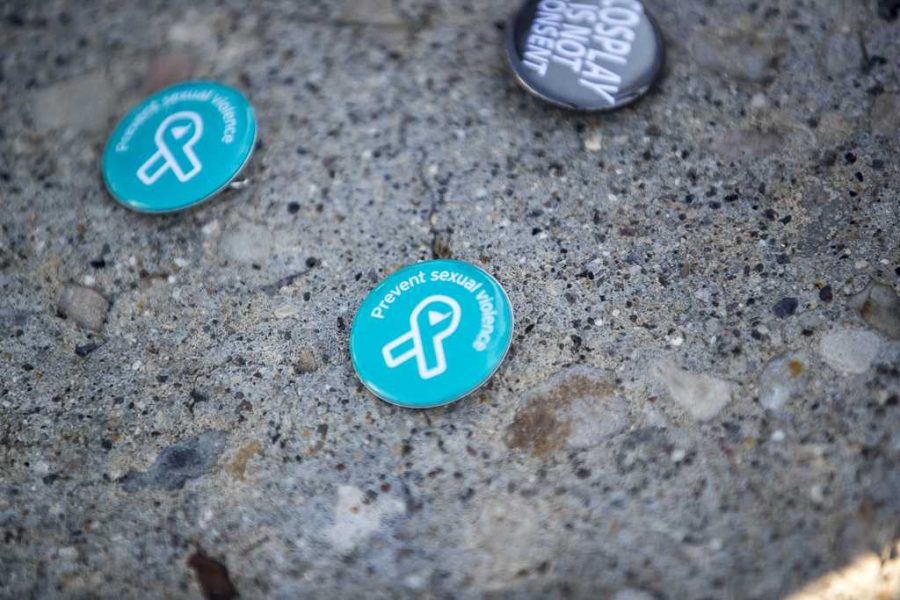Cushman: Utah Needs to Clarify Its Consent Laws to Protect Survivors
Buttons showing support for sexual assault victims during the sexual assault protest in the MEB parking lot on Friday, Nov 4, 2016. (Photo by Chris Ayers | Daily Utah Chronicle)
February 24, 2020
The Rape, Abuse & Incest National Network reports that every 73 seconds, an American is sexually assaulted, and only five out of every 1,000 perpetrators will serve jail time for their crimes. Sexual assault is a particularly important issue in Utah where one in three women experience sexual violence in their lifetime and the backlog of untested rape kits is still growing, making it difficult for victims to attain justice. Representative Angela Romero’s bill H.B. 213 aims to address sexual violence in Utah by updating the legal definitions of consent. H.B. 213 is desperately needed to effectively address the prevalence of sexual violence and better protect survivors of sexual assault in Utah.
In October 2018, Lauren McCluskey was murdered on the University of Utah’s campus by Melvin Shawn Rowland, a man she had previously dated. Her death was devastating not only because it was on campus, but because McCluskey reported Rowland to campus security and regularly updated them about his continually predatory behavior. Campus police did not take her claims seriously. A filing in McCluskey’s parents’ lawsuit against the U stated, “The university knew about Lauren’s sexual abuse and harassment and dismissed her friends’ concerns that it could escalate into violence, even homicide.” McCluskey died despite doing what she was supposed to. Unfortunately, the dismissal of claims like McCluskey’s are all too common by law enforcement that does not know how to appropriately handle sexual violence.
Many victims of sexual violence refrain from reporting because they fear being blamed or that law enforcement would not believe them. One survey found that only one in 10 victims reported the assault to police. Officer Jennifer Smalley described how instead of asking about a victim’s assault, the U’s campus police had questioned the victim’s decisions, clothes, previous sexual history and possible romantic feelings. These kinds of questions can make victims feel as if their assault was their fault when it absolutely is not. By clarifying the definition of consent, Utah can assist law enforcement in better understanding the nature of sexual violence and what they need to look for when investigating a claim.
H.B. 213 seeks to clarify that someone cannot give consent if the perpetrator knows or reasonably knows that “the victim is unconscious, unaware that the act is occurring, is unable to express consent due to alcohol, drugs, or other intoxicants or is physically unable to resist.” The bill would also update language to indicate that a victim cannot consent if they believe that the perpetrator is someone else. It would also require someone fit to consent to offer consent affirmatively instead of “express[ing] a lack of consent.” In some cases, the current law only protects a limited group of people — married individuals who falsely believe they were being intimate with their spouses. This new language would expand that protection to unmarried or married individuals who were victimized by someone other than a spouse. These changes can make the invasive interrogation process victims go through more respectful and productive. Officers would be better prepared to handle assault cases and there would be more avenues for holding someone them accountable.
The bill would also update the law to address misconceptions about sexual violence, including a section that clearly states that prior sexual activity does not constitute consent to a future act and that consent can be withdrawn at any time during or prior to the act, even if it was already given. This is especially important because some rape victims feel humiliated for having prior sexual experience with their abuser or anyone else and worry it would make them uncredible. Taking on these misconceptions directly and explicitly is an important step in becoming more understanding of victims of sexual violence and rightfully placing guilt on perpetrators instead of victims.
Our university requires students to take online Community Standards Courses, one of which is about sexual assault. It includes education about many of the things that H.B. 213 aims to address, such as the role of intoxication and the withdrawal of consent. Reinforcing a correct understanding of sexual assault is certainly important but without the law there to back it up, Utah cannot truly bring perpetrators of sexual violence to justice. Clear and comprehensive laws on consent can help responsible law enforcement officers address sexual assault at the U and across the state. And bringing these issues to the forefront can lead to serious discussions on how to be sensitive towards victims, avoid victim-blaming and increase resources for victims of sexual violence. The legislature should pass H.B. 213 to assist law enforcement professionals and most importantly, protect survivors across the state.







